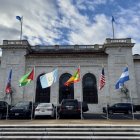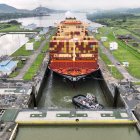Analysis
China's dangers in the Americas: Influence, investments and the battle for the West
These were the central themes of an event that brought together conservative experts in Buenos Aires, Argentina. VOZ covered the meeting live, which featured a diverse array of international speakers.

China and the Americas organizers and speakers/ Lucas Buchberger.
"The nature of the threat against us is not a classical threat that comes out of Greek politics or the legends of the past. We're not talking about international strategic studies that we are taught in universities. This is a form of combat against the building blocks of civilization. There's an attack on family. There's an attack on faith. There's an attack on fundamental institutions," Stephen Yates, former deputy national security advisor to Vice President Dick Cheney, recently said of the threat that China poses to the United States and Latin America.
Yates made these statements during a meeting of experts that focused on analyzing China's role on the global geopolitical chessboard and how this affects the West. The event took place in Argentina and the slogan was evident from its title: "China and the Americas".
The event was jointly organized by The Heritage Foundation, the Free Foundation, the Center for a Secure Free Society (SFS) and the International Freedom Educational Foundation (IFEF).
The FREE Foundation is a think tank that works to connect the conservative worlds of the United States and Europe with Rio de la Plata. On this occasion, it established itself as a bridge between them by connecting the organizations carrying out the event.
Together they were able to present an interesting array of speakers, including Joseph Humire, director of SFS; Carla Sands, former U.S. ambassador to the U.S. and Europe; former U.S. Ambassador to the Kingdom of Denmark, Alejandro Chafuen, president of IFEF and Miguel Ángel Toma, former Director of the State Intelligence Secretariat (SIDE). They were also joined by Enrique Ghersi, former congressman of Peru, Nicolás Promanzio, Argentine political commentator and Andrés Martínez-Fernández, senior analyst for Latin America at Heritage, as well as Yates himself.
Over the course of several hours, the speakers discussed different sides of China's impact on the United States and globally. VOZ covered the event live from the Naval Center in Buenos Aires.
"China seeks to weaken the foundations from the West from within"
Chafuen was the first to take the floor. In his opening remarks, he said the first Chinese objective is to "weaken the foundations from the West from within," although he urged caution against demonizing the country's citizens. "One thing is the Chinese citizen and another thing is the Chinese Communist Party (CCP)," he added.
Next came Yates, who asserted that China is the "biggest threat to the American way of life." He focused mainly on the consequences of China's actions and fentanyl leaving its borders. Indeed, he recalled the tens of thousands of people who died last year from this opioid.
"This is something that was not talked about more than 10 years ago very much at all. But in the 40 years of the Biden administration, 400,000 Americans lost loved ones directly tied to the pencil trade. And like COVID, we know exactly where three-person pencils are manufactured," he said.
He also remarked that the CCP recently disassociated itself from the fentanyl crisis, which Yates criticized as irresponsible.

Opinion
China Aims to Seize Control of the OAS, Boosting Its Influence in Latin America and Washington
Vanessa Vallejo

"The West must defeat the Chinese Communist Party in international institutions"
Then came Sands’ turn. She also serves as the vice president of the Center for Energy and Environment at the America First Policy Institute. During her speech, she praised Donald Trump for withdrawing from the World Health Organization (WHO) and the Paris Agreement, highlighting China's influence in supranational bodies.
"The West must defeat the Chinese Communist Party in the international institutions in order to prevent global communism from taking over. I'm not just saying that this is a concern. I'm saying it's a three-alarm fire. So what do we need to do? We need to take those positions of leadership in international organizations. We need to harden our media, not to take the propaganda to be the mouthpiece of the Chinese Communist Party. We need to support our businesses," the former ambassador to Denmark continued.
In turn, Sands added that the CCP's strategy is to gain influence in all possible Western institutions through quite effective means: money.
"And if you see there, even, there's no politician they won't try to bribe, and that's on both sides of the aisle. We saw the infamous call that Biden made, or the texts he made to high-level party officials that they wanted their money. But it's not just at the presidential level. Even school boards they tried to control. Universities, whatever students taught, they sent students, and then they tried to control the content. They go to lower-level offices, what we in the U.S. call low offices, to exert pressure. They give money even to parks in order to control what is shown, what entertainment is shown at the park," she added.
">Great conversation in Buenos Aires, Argentina about how to confront the China challenge in the Western Hemisphere. Thank you to our partners @free_fundacion @Heritage and @A1Policy for organizing and participating in this important event. @jmhumire @JJCarafano @YatesComms… pic.twitter.com/yyfnimH5Wm
— Center for a Secure Free Society (@SecureFreeSoc) March 6, 2025
China and telecommunications
Humire, a national security expert specializing in asymmetric warfare, began his participation by praising President Trump and his geopolitical approach.
"You can analyze his social media, you can analyze his demeanor, you can analyze his hair, you can analyze whatever you want, but if you pay attention to the policy of President Trump, we have already four years of body of work that was done under his administration, and now we have focus on a new administration. You should understand the positive effect of what these policy drafts are doing, turning into an actual doctrine of US foreign policy, which is known as America First," he said.
Humire also discussed China's role in telecommunications, particularly with 5G and the social media platform TikTok.
"As much as China wants to deny that TikTok has nothing to do with their government, if you go to the origin of the company, you fundamentally understand that it is tied to mainland China, Beijing, and fundamentally when you understand their national security doctrine and their laws as of 2017, there is no way a type of sector organization can distance themselves that much from the central government. And in that, as much as China wants to promote TikTok all over the world, in particular also in the United States, they don't open the market to Google or Facebook," he added.
Finally, Humire assured that the United States is refocusing on Latin America in the face of the Chinese advance. However, he remarked that the region's countries have to think twice before doing strategic business with China. "Which countries grew up doing business with China?" he asked those present.
The Latin American country with the greatest Chinese influence
Other speakers included Enrique Ghersi, a former Peruvian congressman, who assured that "Peru is the country with the greatest Chinese presence in South America". After establishing historical explanations, he commented on Chinese interest in advancing in the country, specifically through strategic investments.
"They no longer put a gun to your head, they put a million dollars in your hand", he affirmed, and then gave concrete examples. He spoke first of the electricity grid in the city of Lima, the country's capital, which is completely under the "control of Chinese companies." "If they want they can leave the city without light," Ghersi continued.
He then spoke of the Chancay Port, the largest in the South Pacific, which was inaugurated in 2024 and was built with $7 billion (USD) in Chinese investment. In turn, it is operated by the Chinese company COSCO SHIPPING.
China's particular interest in Argentina
The person in charge of talking about the relationship between China and Argentina was Miguel Angel Toma, who described how this relationship has been growing by leaps and bounds since 2007. Trade between the two countries exceeded $80 billion (USD) and Chinese investments have been strengthened in sectors such as mining and telecommunications.
Regarding these investments, Toma reassured that they do not seek profit or profitability, but rather long-term strategic control.
Specifically, he mentioned the Chinese space station in the province of Neuquén and its advance in building a deep water port in the province of Tierra del Fuego, thus expanding its influence over the South Atlantic and Antarctica.
























